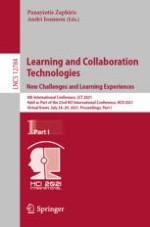2021 | OriginalPaper | Buchkapitel
Japanese EFL Learners’ Speaking Practice Utilizing Text-to-Speech Technology Within a Team-Based Flipped Learning Framework
verfasst von : Yasushige Ishikawa, Shinnosuke Takamichi, Takatoyo Umemoto, Masao Aikawa, Kishio Sakamoto, Kikuko Yui, Shigeo Fujiwara, Ayako Suto, Koichi Nishiyama
Erschienen in: Learning and Collaboration Technologies: New Challenges and Learning Experiences
Aktivieren Sie unsere intelligente Suche, um passende Fachinhalte oder Patente zu finden.
Wählen Sie Textabschnitte aus um mit Künstlicher Intelligenz passenden Patente zu finden. powered by
Markieren Sie Textabschnitte, um KI-gestützt weitere passende Inhalte zu finden. powered by
